Tax bills are a recurring expense for all businesses including dental practices that can often take their toll. This is where tax loans come in and help manage this overbearing expense by helping you take control of your cash flow. They also help ease the costs of taxes by spreading the costs of your tax bill into manageable monthly payments.

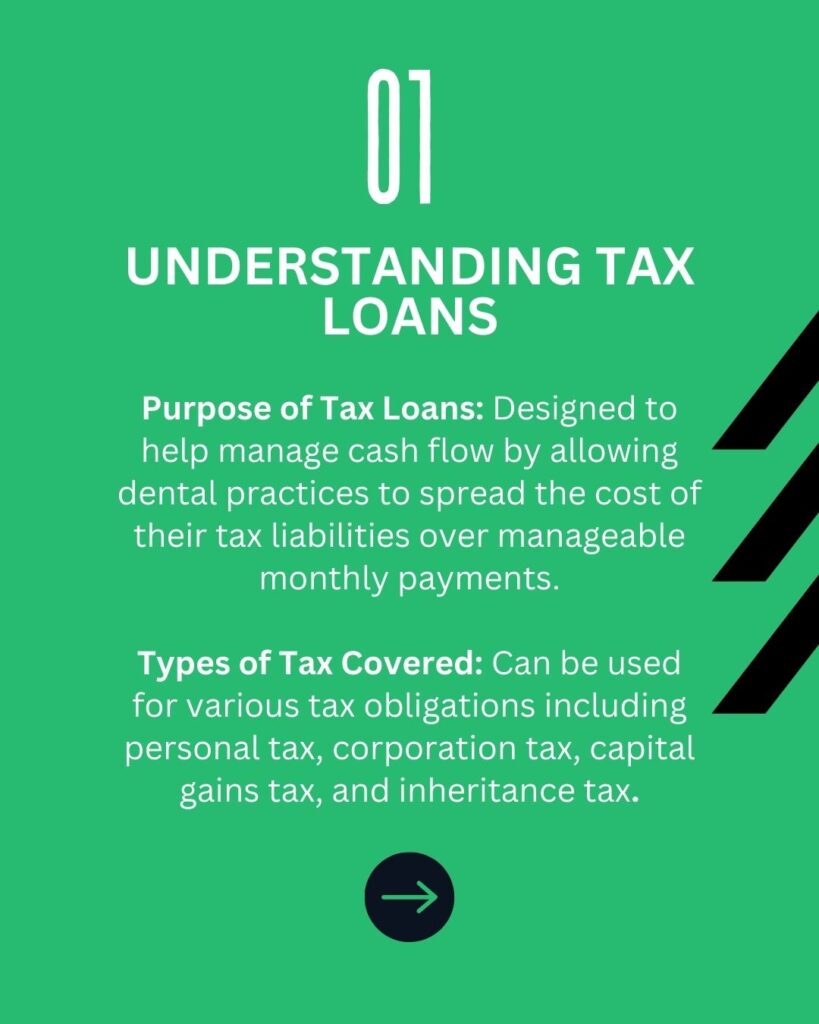
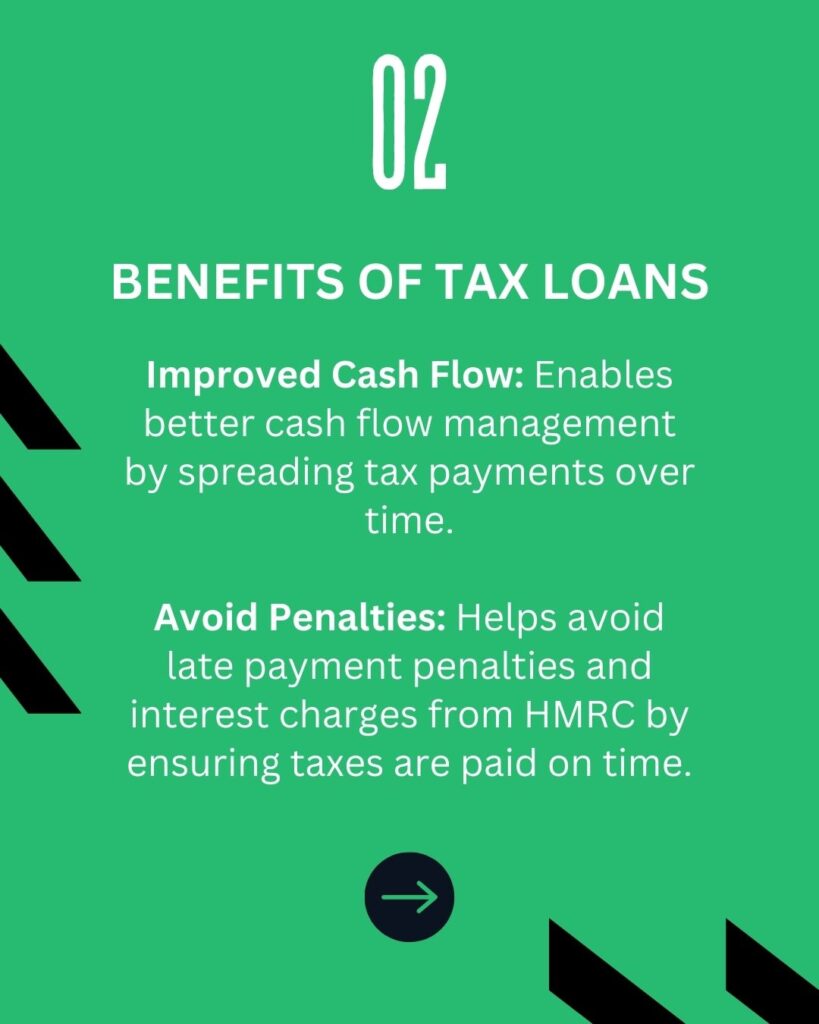
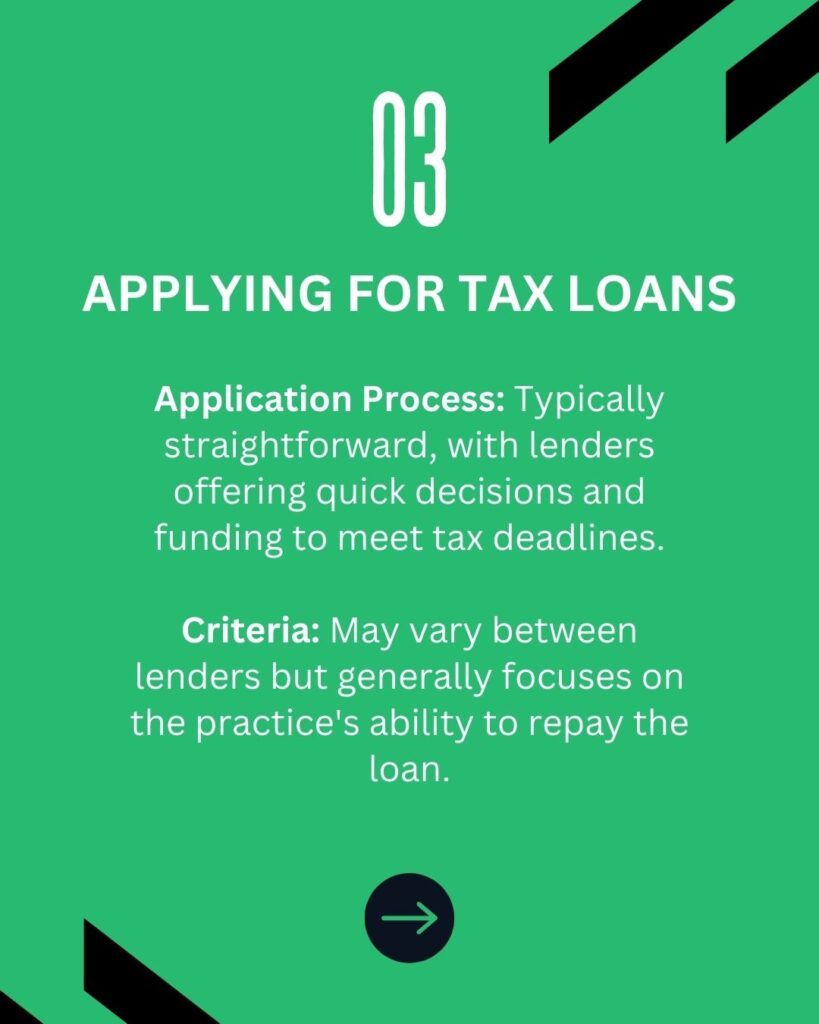
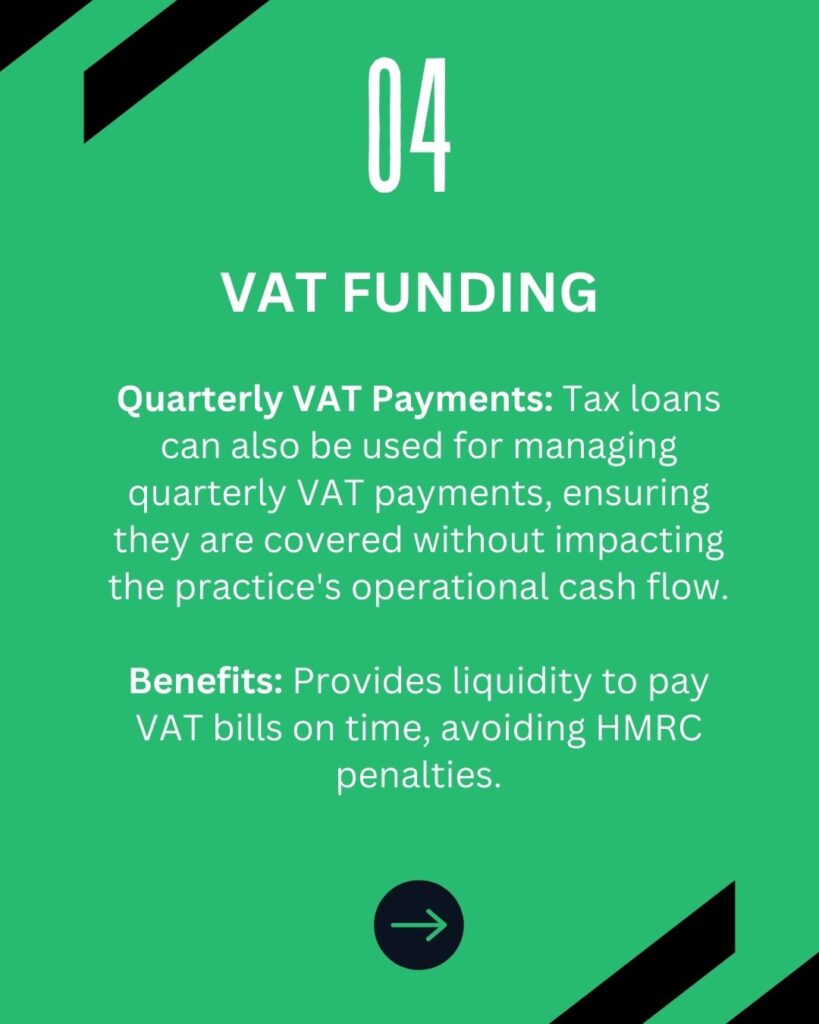
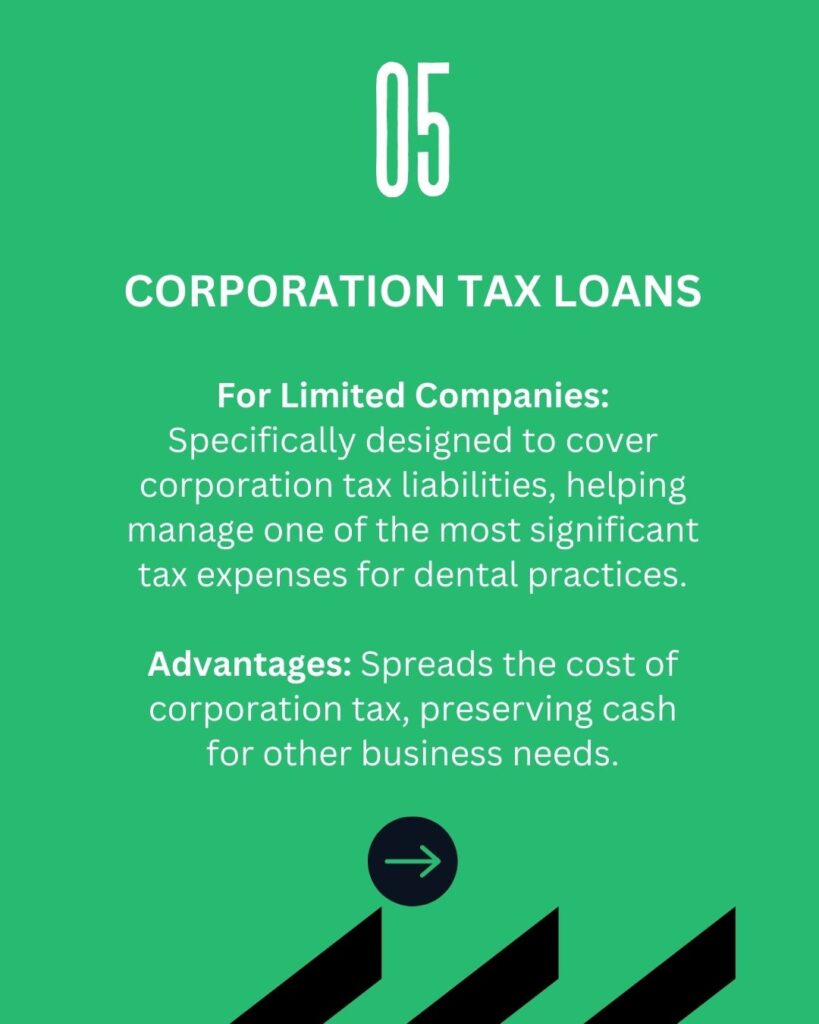
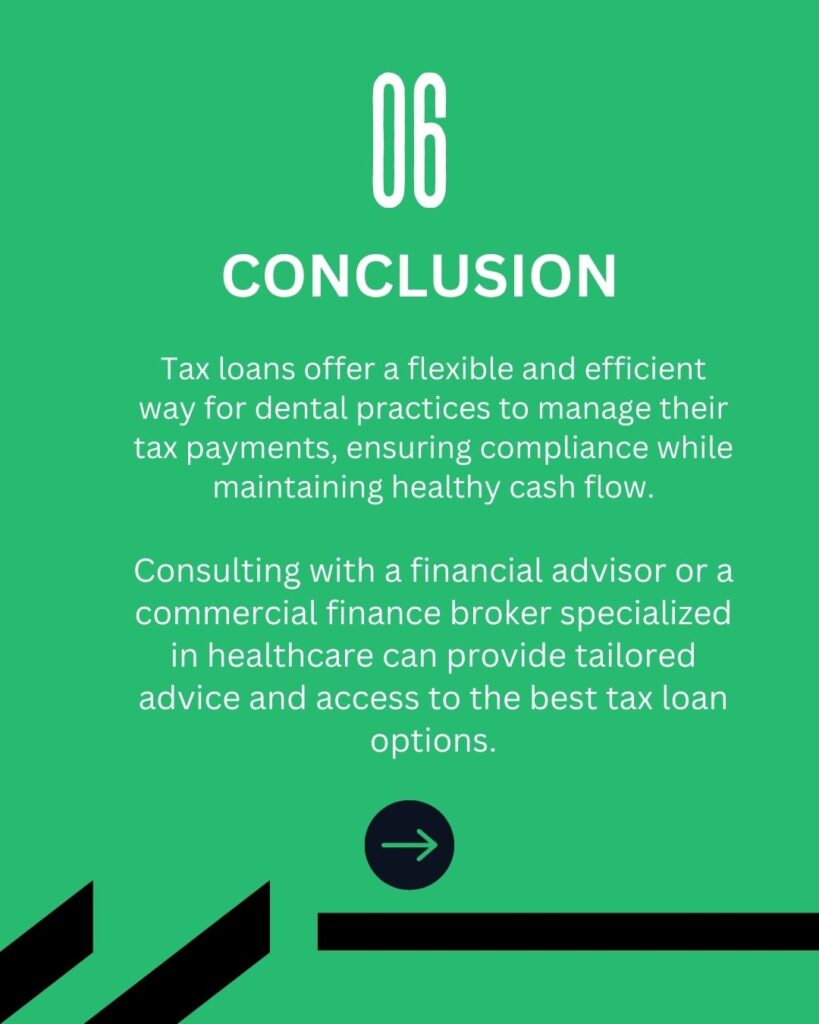

The amount of taxation that a business incurs is based on current tax laws that determines their tax liability. Tax liability is the amount of tax debt owed by an individual, business, corporation or any other entity. Tax liabilities are therefore incurred from earning any income from a business, a gain on the sale of an asset, estate or other taxable events.

When a business’s tax liability is due, as a dental practice, they have to ensure that they have enough cash flow at hand to meet the demand of the tax laws in place. Unfortunately owing tax isn’t an easy debt to get out of. A tax bill cannot be put off until the business itself pays the bill. HMRC do not hesitate in issuing penalties for late or non payments. The tax rules are very strict and failure to adhere to them can become very costly for you and your business.
In some instances, late penalties are one of the more tranquil consequences that the HMRC gives out. Penalties for late payment or non payment can have very bad consequences on your business. If you default on your payments for a very long time, the interest of your tax bill increases and so does your fines. This could lead to you having to liquidate a company in its entirety or its assets in order to fully pay HMRC what is owed through your tax liabilities.
It is normal for a business’s cash flow to fluctuate over the different seasons, however, it is imperative that funds are put aside in order to meet tax obligations. However, this is often not always the case. The cash flow may not always be there and unforeseen circumstances do occur to hinder you from being able to pay your taxes. This is where tax loans come in handy for businesses.
VAT and corporation tax payments come around regularly but they can still be a problem if your business does not have sufficient funds. Tax loans are designed to help manage your cash flow. Tax loans can fund personal tax, corporation, capital gains, inheritance tax amongst other overbearing tax bills you may incur. Tax loans allow you to spread the cost of your tax demand into more affordable monthly payments, allowing you to pay your tax bill comfortably.
Contact us to find out more
What is VAT funding?
When quarterly VAT payments are looming for your dental practice and there is limited cash in the business to secure paying this bill, access to additional finance is very useful.
VAT funding enables businesses to pay your quarterly VAT payments over the course of an agreed term (usually 12 months). This will be paid back over a series of monthly payments. This loan provides the liquid funds needed for businesses to settle their VAT bill without provoking any consequences from HMRC. Obtaining this loan will boost the company’s overall cash flow position as well as pay your VAT bills smoothly.
As a business owner, there are a few things that may be worrisome for you. Owing the government funds can unfortunately often be part of that worry. A lot of business owners are not aware of the options that are available to them when they do not have enough working capital to pay the necessary bills.

Businesses try to optimise their profits and strive to have working capital to reinvest and take advantage of business opportunities. For this reason, tax loans are becoming increasingly popular. These loans allow businesses to free up cash flow while meeting the demands of HMRC on time.
Forfeiting a tax payment or paying late is something you must try to avoid at all costs. Owing a debt to the HMRC is not something to be taken lightly. Often those who default on their tax payments are dealt with enforcement actions being taken against them.
Regardless of what your business is, taking out a tax loan can be the financial solution that you need as it will enable you to spread out the cost of your tax bill over the course of a 6-12 month term helping businesses navigate through the costs of tax while avoiding the wrath of HMRC and racking up late payment charges.
Why are tax loans useful?
Tax loans are incredibly helpful and convenient to help pay your tax bill on time. On the one hand, it is in your best interest to stay within HMRC’s good graces by paying all your tax bills on time while on the other, you also want to leave yourself available cash for the essential day to day running of your business. Tax loans help you do both, very comfortably.
Many lenders design your loan specific to your needs, there are loans that are specifically designed to pay tax bills. In some cases, funding a VAT bill can have tax benefits. This is because interest payments are often offset against corporation tax later in the financial year.
Benefits of tax loans
- Improved cash flow as well as control of cash flow
- Easy, fixed monthly repayments
- Flexible repayment terms
- Easy quick and simple to arrange
- HMRC receive payments directly and on time
- Protects existing bank facilities
- Keeps your bank funding lines open
- Fixed rates
- Fast decisions and fast funding
- Personal service and dedicated account manager
Many tax loan facilities operate in ways to enable you to receive the funds you need in a simple and timely manner. The main benefits tax loans have to businesses is that this loan will allow their cash flow to remain in their control, lift the weight of their tax bills by spreading out the costs into manageable monthly payments and avoiding any late payment consequences.
How do I apply for tax bill funding?
As a dental business owner, VAT or tax payments can be detrimental to your business profits. Time constraints are very common, especially when it comes closer to the time to pay your tax bills. This is why the process of applying for funding is quite quick and simple.
Unlike many other loans, detailed business plans and security assets are not needed, nor is it necessary to make long winded appointments to discuss the security of your loan. Many processes are flexible and quick with great affordability and transparency.
Tax refund
Loan against tax refund
Taking out a loan against your tax refund is also known as a refund-advance loan. It is a type of secured loan. This means that you need to put up something in this loan to use as collateral. Usually this would mean an asset or an estate but in this case collateral refers to your anticipated tax refund.
Tax refund loans are short term loans that must be repaid when you receive your tax refund. You will often receive this loan as a deposit into your bank account . When you get your tax refunded, it will be deposited into that same bank account and the loan amount will be deducted from the amount given. Interest and other fees will also be deducted from the amount of tax refund given to you.
Pros and cons of tax refunded loans
Here are a few things to consider before you take out a tax-refund loan.
Pros of tax-refunded loans
Fast funding
When you apply and are approved for a ta-refund loan, the funds are available to you as little as 24 hours after you are approved. Usually the time it takes from your tax to actually be refunded to you is a minimum 21 days.
Cons of tax-refunded loans
Fees
Unfortunately getting a tax refund loan may often involve paying interest on said loan. This is not the case with all tax refund loans, there are some lenders that are able to give you an interest free loan. However, even with an interest free loan, there still may be fees you will need to pay, for example, administrative fees that are associated with transferring your refund.
High risk
There are potential risks with this kind of refund loan. The key risk being that the amount of the loan is based on how much you anticipate getting back in the refund. This may not accurately represent how much your tax refund will actually be. There are several factors that could impact that amount you are expected to receive and the actual amount you are given.
An example of this is that if you owe a state debt such as a student loan or back taxes. These debts will be taken from your tax, therefore, your tax refund will be reduced. This will result in you receiving less funds than you had anticipated when taking out the loan.
Tax refund loans
While tax refund advance loans can be a helpful and timely option to get the quick cash flow you need, there are many factors you must keep in mind before you decide to apply for this type of loan.
If you do decide to apply for a tax-refund advance here are a few things we advise:
Proceed with caution:
These loans can often come with a high interest rate and hidden fees.
Read the terms and conditions carefully:
To allow yourself to make the most out of this loan, you must ensure that you fully understand the terms and conditions of the loan and all the costs in their entirety. This includes any contractually included late fees or any prepaid card costs associated with the loan.
Contact us to find out more
Related Articles & Webinars
How to save money, tax and time in your dental practice
Corporation Tax Loan
Corporation tax is the one of the most important taxes your business, however large or small, will pay. If you are unable to pay your corporation tax bill, you will be hit with penalty charges which will increase the longer you default on your payment and will exceed the overall amount you originally owed, fundamentally resulting in you being in a worse financial situation.
Charges begin from the day your payment is late, the interest of the lay payment will also continue to rack up over time so it is important to meet your payment deadlines.
If you are unable to pay your tax bill because the time for paying your taxes has come at a very inconvenient time for you, then a corporation tax loan would be ideal for your situation. It is an effective way to spread your tax demands across monthly repayments that are affordable for you.

What is corporation tax?
Corporation tax is a tax that all limited companies must pay. It is a tax that is payable against the profits the company makes. A corporation tax bill is based on the level of income a business has earnt through trading. It is the income derived from taxable events throughout the tax year such as asset sales. You are liable to pay corporation tax if your business is a member’s only club, a trade association, a limited company, a trade or housing association, or a group of individuals outside a partnership operating as a business.
The current rate in the UK for corporation tax is 20%. This also applies to any companies you may have overseas but have an office or branch residing in the UK. HMRC usually calculates your corporation tax bill roughly 9 months after the business accounting year comes to an end.
If your tax liabilities are not paid on time, similar to your business tax expenses, there will be penalties issued by HMRC. If your tax bill is quite high, the business itself could be forced to liquidate completely in order to pay your tax bill. The real truth for many businesses is that they sometimes simply are not in a position to be able to pay their bill which is why corporation tax bills can be very useful. It is important to note that HMRC will not send reminders about your tax bill until you are overdue.
This is a difficult situation to be in, especially if your current available capital does not allow you to meet the demanded amount of the corporation tax bill. Ideally, the best option is to set aside funds during the year to meet your tax bill however, It is normal for cash flow to fluctuate over the year based on different activities. This makes it hard to put a large amount of money aside especially when you have unexpected costs to pay. This is why corporation loans are becoming increasingly popular to help regulate cash flow and pay for a business’s tax bill.
Who pays corporation tax?
All limited companies are liable for corporation tax. The tax is also aligned to the financial year of the business. However, there are a few exceptions such as when a new business changes its year end accounting date.
Businesses are bound to pay taxes on any profits the business makes in its financial year. Corporation tax is also due on any money the business makes from investments and any chargeable gains.
Benefits of a corporation tax loan
Corporation tax loans improve a businesses cash flow which is why they are increasing immensely in popularity amongst many different types of businesses. This added stable cash flow allows businesses to take advantage of this added capital to their business to fund unexpected costs or any drops in income.
A major benefit of a corporation taking a loan is the added cash flow to your business. The loan also helps avoid the risk of high and very costly charges for late or non payment of your taxes. The loan itself will improve the flow of your capital, this means that when your next corporation tax loan is due, you will be in a much better position to comfortably pay the bill.
Regardless of the type of business you operate, it is possible for you to qualify to apply and receive a corporation tax loan. The loans have various options that are flexible for you and they will enable you to spread your tax bill over the course of several months. You will have fixed monthly or quarterly payments to repay your loan.
There are a variety of lenders who specialise in commercial finance loans. They are able to design a plan that is flexible and suited to your specific repayment abilities to ensure that you will be able to pay your tax bill comfortably with monthly installments.
Using corporation tax funding allows businesses to avoid the potentially costly HMRC penalties for late or non payments. You can usually get a decision on your corporation tax loan inquiry within as little as 24 hours in most cases.
Where to apply for a corporation tax loan
There are a number of lenders who specialise in finance loans specific to paying tax such as corporation tax loans, which gives you many options to choose from. There are various online comparison tools that will be perfectly aligned to the needs of your business. These comparison tools and websites will also help you filter through different loans that are best suited to you with the lowest interest rates.
Click here to read our article on How to finance a healthcare business.
Business Loans for Healthcare Businesses
We’ve been helping to fund the future of British healthcare businesses for over 20 years and our team are made up of former bankers with decades of experience in the UK’s healthcare lending sector.
You can find out more about working with Samera and the financial services we offer by booking a free consultation with one of the Samera team at a time that suits you (including evenings) or by reading more about our financial services at the links below.
For more information on raising finance for your healthcare business, including more articles, videos and webinars check out our Learning Centre here, full of articles and webinars like our How to Guide on Financing a Dental Practice.
Make sure you never miss any of our articles, webinars, videos or events by following us on Facebook, LinkedIn, YouTube and Instagram.



